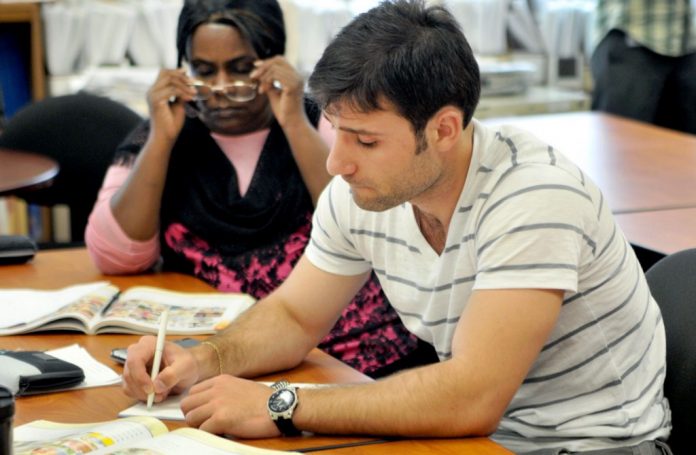Amir Fayzullayev (center) from Russia and Ibtisam Babiker from Sudan in ESL class at the JEVS Human Center for Refugees at Orleans Technical Institute. The JEVS Human Services is celebrating its 70th anniversary, Tuesday, June 12, 2012, Philadelphia, Pa. (Maria Pouchnikova)
JEVS Human Services celebrated its 70th anniversary last month with a gala at a Lafayette Hill country club, and guests had a chance to talk about all of the changes in the last seven decades.
Back in the beginning, JEVS helped Jewish refugees fleeing Europe during the Holocaust to find employment in the United States.
But in a way, the agency’s mission has stayed the same.
Its Center for New Americans — located at Orleans Technical Institute, 2770 Red Lion Road — is still helping refugees, but those folks are coming from places like Iraq and Liberia.
Zoya Kravets, director of the Center for New Americans and a native of Ukraine, said her staff continues to help make clients independent and self-sufficient.
“We wanted that seventy years ago and now,” she said. “We want to help people. A refugee is a refugee.”
Since 2000, the Center for New Americans has seen about 4,000 people and placed more than 3,000 of them in jobs.
In a recent seven-month period, the center worked with 187 clients from 36 counties.
Services are free and are available to residents of Philadelphia, Bucks, Montgomery, Chester and Delaware counties. Besides assisting refugees, the center works with those who’ve been granted asylum and victims of human trafficking.
Staff members help clients prepare resumes and get ready for job interviews. They teach them English and computer skills, along with helping them understand American culture and history.
Adults are given leads to full-time work in a variety of fields. For 16- and 17-year-olds, there’s a focus on part-time work during the school year and full-time employment in the summer.
Among the languages spoken at the center are Ukrainian, Russian, Polish, Arabic, French, German, Hebrew and Hindi.
Larisa Clymer came to JEVS in 1979 as a Ukrainian refugee and received financial, educational and vocational support. She worked for about a decade in the health field, but returned to JEVS as a counselor. She’s taught English as a Second Language classes and now works as an employment counselor and job developer. She’s passed retirement age, but the work remains her passion.
“I love my job. That’s why I’m still here at my age,” she said. “JEVS is a special organization. We become part of the refugees’ lives. We’re in a better position to help them because we have the experience.”
Clymer works especially closely with Iraqi immigrants, helping them to understand that a Jewish organization wants to help them and that Jewish employers will hire them, as long as they are good workers.
“We’re very successful with Iraqi clients,” she said. “We help everybody. We never refuse anybody. It’s against the law to discriminate.”
Shaymaa Mohsin came from Iraq in 2008, enrolling at the University of Idaho to complete a master’s degree in environmental engineering. She’d never heard of the state of Idaho before arriving there.
In May, she was hired by JEVS as a case manager, and she is putting her engineering career on hold to work with refugees.
The 33-year-old Far Northeast resident, who speaks Arabic, takes particular pride in helping refugees overcome barriers to employment, such as language, culture and day care.
“I finally found the job I wanted. This is the job of my dreams,” she said.
Mohsin said people from Iraq feared Saddam Hussein, adding that residents of other Middle Eastern countries are wary of dictators running their nations. Once in the United States, she said, these refugees embrace the “melting pot.”
“I’m working for a Jewish organization. The barrier is not there. You don’t expect a Jewish organization to provide services to Muslims,” she said.
Marcellin Mekonnodji came to the U.S. from Chad in 2007 to study at St. Joseph’s University. He knew little English, but received help at JEVS.
Now 38, he is a job developer and employment counselor at JEVS. He speaks English, Arabic and French. He thinks he’s made a difference in three years on staff.
“You help people from different countries in need of help to become independent,” he said.
Kravets, the center director, had several jobs before coming to JEVS. She was a hospital interpreter, paralegal and Dunkin’ Donuts store owner before being hired by JEVS.
In her view, the center is effective despite the poor employment picture.
“It’s tough. Americans can’t find jobs, and we’re trying to place foreigners,” she said. “But we’re doing a good job. We exceed our goals thanks to an excellent staff and a nice group of volunteers.” ••
For more information about the Center for New Americans, call 215–728–4210 or visit jevs.org





